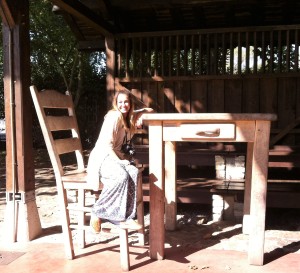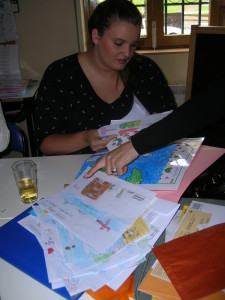Megan Schones, Oviedo fall 2016 shares with us how much volunteering with disadvantaged children in a local NGO enriched her academic experience, helped her immerse and enhance her understanding of the culture.
“Before I felt just like an American, going to an international school and learning the language, learning some things about the culture through my classes, but most things I learned were from my host mom at the dinner table talking about things that my limited vocabulary could comprehend. Now, I am getting more perspectives on the culture, and I am not feeling just like a student who attends school, because I now have extracurricular activities. Volunteering at trauma has helped me feel adapted to the culture since I am helping in an environment that matters to these children and adults who work there. Knowing that even after I leave trauma will still be going on, and still be important to these kids makes me feel like I am becoming a part of the culture. Because even at school I am surrounded by more foreigners from China and Japan and other places all over the world, but not many Spanish students. I no longer just go to class and afterwards go exploring with my American friends. I have obligations and responsibilities to attend to, which excites me. I like being able to come home after a long day and have more to talk about than just my three classes I am taking.
Also I am helping a fifteen year old girl practice English, and she helps me just as much as I help her by giving me insight of what it would be like to be her age growing up here in Spain, we talk a lot about her activities she does and about her family. It’s really a neat thing to be able to get such a variety of sources to hear about a culture. From my host moms point of view, to my professors, from the children at trauma, and even the teenager. Another reason I feel that I am at the adaptive stage is because I go to some of these events completely alone, I don’t have my American friends to cling on to which is easy to do since they are the closest thing I have to home. It makes me step out of my bubble and really get the chance to be fully accepting and curious of this other culture. And to learn it through all different age groups and environments has helped me even more. I feel that just in these past couple weeks starting these events has impacted me greatly
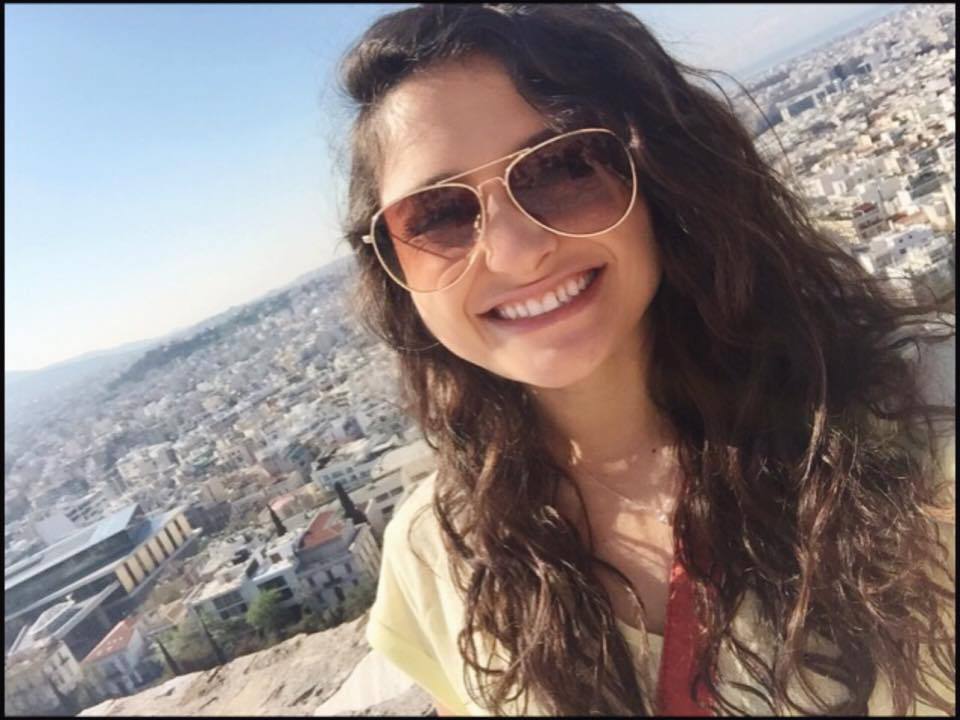 Maddie Duncan worked as a language assistant in local elementary schoool during the spring 2016 term. Read her blog entry describing her first day on the job and insightful comments about learning and teaching a language.
Maddie Duncan worked as a language assistant in local elementary schoool during the spring 2016 term. Read her blog entry describing her first day on the job and insightful comments about learning and teaching a language.
Semana 7: Learning of Language
“Recently, I just started volunteering as an assistant to two different English teachers at the elementary school in Oviedo. In my first class, I have children who are between the ages of 7-8 and know very little English. They know the basics, such as “hello,” “my name is…” and “my favorite _____ is _____.” My second class has children ages 9-10, who surprisingly know a nice chunk of English. I say surprisingly because the majority of ten year olds in the United States know as little Spanish as “hola.” When I stood in front of the class, being asked lengthy questions, ranging from my home life to a normal day in college, the students spoke very clear and accurate. I have no problems understanding their English.
Any person who knows me well can attest that working with children is one of the most rewarding things in the world to me. I believe it is something where they can teach me as much, if not more, than I can teach them. Being a friend to a child brings me genuine happiness to the utmost.
This Monday was my first official day and the students have already got me thinking after approximately three hours. I am given groups of five or six students to take to the library to work with them on an assignment or a page from the textbook. On Monday, we had finished going over the worksheet quicker than expected, so I started asking questions. One question I asked the 7-year-olds was if they liked English so far. The majority of them got very excited and gave me a multitude of “Sí, sí, mucho!” One student looks at me and says, “pero es dificil.” (But it’s hard.) I explained to him how I am here learning Spanish and it is hard for me too. I told him I make mistakes all the time but that’s how learning a different language works. His response was something I had no answer to. “Mi mamá me dijo que no tendré un futuro sin Ingles.” (My mom told me I will not have a future without English.) The other students agreed.
I am not going to argue that this woman is completely wrong. English is easily the most widely spoken and fastest spreading world language. There is no doubt that it is very beneficial to know English, not necessarily fluently, but even a little is helpful. The part that got me thinking with what the child said was the fact that he is seven years old. He is seven and already worrying about learning English in order to get a job in the future. I think it is amazing that schools here start teaching English to children at a young age, but it was sad for me to see children so little, afraid to make mistakes or not understand something. Spanish is the second, most common language spoken in the United States, and yet we still have people fighting to get more elementary schools to teach Spanish solely at its most basic level. In high school, we are forced to study a language but it is mainly thought of as a “as long as I can end with a C or higher, I’m golden.” I know this because that was me. If I could go back, I would look at my Spanish classes with a whole different view. Huge apology to my high school Spanish teachers…
Being here has made me realize how truly powerful the United States is and how many advantages I was given, simply for where I was born and the language I speak. I could get a job easily in the U.S. without knowing a lick of Spanish, but even in Spain these days, where Spanish is the #1 language, it is difficult (not impossible) to catch a job without knowing English. Not only did I realize that, I also realized how much respect I now have to Spanish-speakers who struggle and take the time to learn our language each and every day. It gives me that extra motivation to learn their language and finally give them the opportunity to watch me make mistakes and feel uncomfortable sometimes.
Spaniards, Hispanics, etc. learn English to be able to communicate with us and make our jobs easier, but why is it not more common for Americans to do the same? It is not a head turner to see job postings that say “Spanish-speakers wanted.” This is because it is important. There are so many Spanish-speakers in the United States who want to feel comfortable, too. My whole point – Don’t slack in the Spanish courses, guys. They are actually really important and beneficial. And yes, I just wrote 800 words on something a child said to me. Dang it, Maddie.”
Samantha Jansen served as a language assistant in a local elementary school during the spring 2013 term.
“I headed down to the elementary school to volunteer one last time. The kids all drew me pictures and then sung songs to me. These pictures are easily the best thing I will be taking home with me. In the end, Lourdes asked them to raise their hands if they had anything they wanted to tell me. Nearly every single student raised their hand and told me I was the best teacher in the world, that they’d miss me, that I helped them a lot, or that they love me. I almost started crying right then and there, but anyone that knows me well knows that I’m not a huge crier. Next, Lourdes and the other teachers gave us all a portfolio of the drawings, a certificate, and a pen from the school. It was absolutely lovely.
Megan McDonough served as a language assistant for 8 hours per week at an Oviedo elementary school. She was featured in a teacher’s blog for the class where she volunteered in the spring of 2013
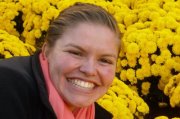
Katie Lightfoot served at ASPACE ( Asociación de Ayuda a Personas con Parálisis Cerebral) Oviedo chapter 3 days per week during the 2011-2012 academic year.
I befriended a lady in her sixties, who has no family and lives at Aspace. She does not have the ability to use her legs, but navigates her way in her electric wheelchair. She is a sweetheart and notices me the minute I walk in the room with a big smile on her face, but does not have the ability to use her voice to talk. So at the center I helped her navigate the computer, practiced using her talking device, helped her use her hands to express herself through art projects, and assist her with eating and drinking. On Saturdays, I go on meriendas with her and the other residents at Aspace. We drive to different polas in Asturias and go for a walk and have a café at a local cafeteria and befriend them all. I assist residents with walking, eating, and drinking.
My experience working at ASPACE was absolutely wonderful, I got to do what I love most- helping others. I also was able to practice my Spanish speaking skills with all the residents and employees, at the same time as learning how the social services and school systems are run here in Spain. And Pili has become an inspiration in my life. I would say they gave me more than I could have ever dreamed of giving them.
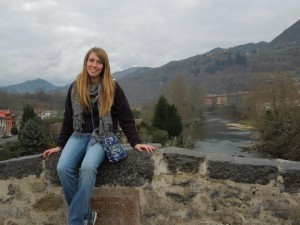
Alex Morton volunteered with the Red Cross in sociocultural animation with hospitalized children at the Hospital Central’s Pediatrics Ward during the spring 2012 term. After graduating with a degree in Anthropology, Alex joined the Peace Corps and has been serving in Paraguay.
“I went to the hospital two times every week for two hours each time. Each time I was assigned with a different partner or small group. First thing we would do was go down to the rooms we were assigned and ask which of the kids would want to come play with us and what they wanted to play. Sometimes the kids would be able to leave their room and go to the lounge, other times they would have to stay in their room, and in special cases we would have to put on a gown, gloves, and mask before entering their room. Once we knew what kids were coming and what types of games/crafts they wanted, we would go back upstairs and grab the materials we needed. Then we would go play with the kids for the remaining time. I found this experience very rewarding! There was a lot of patient interaction, which is not the case in the US when volunteering at a hospital. I was assigned with a different patient almost every time, but I was able to make some bonds with the others who volunteered there, and the coordinator was very nice!!!

Jackie Spezia volunteered in an elite private school in Oviedo during the spring term of 2012. After the program she worked in the study abroad office of Oakland University until she graduated.
“My experience at the Laude Palacio de Granda was a great one. I had so much fun spending time with the students. I have to admit they were a little intimidating at first but now that it´s time to say goodbye I am going to miss them dearly. The energy that once frightened me now makes me laugh and gives me hope for the future generation. The students I met were so intelligent and full of life; during one of the classes we talked about how they imagined their futures and they all have big plans. I wish I could stay and help them along their journeys but I know there will be others along the way to help them reach their goals.
I am also thankful to the students for everything they gave me. I learned so much about the Spanish life from them; more than I could have ever learned from a book. Hearing their first hand experiences and opinions gave me a better understanding of what it means to be Spanish. Also, seeing my culture through their eyes helped me to better appreciate, and recognize the flaws in, my own society. I will always treasure the time I spent at the Laude Palacio de Granda and I will carry the students in my heart as I return to the United States. “
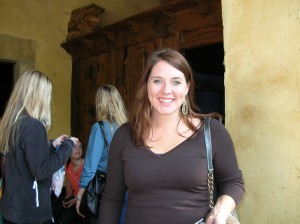 Amanda Gerke studied abroad in Oviedo during the 2002-2003 academic year. She returned as an intern in our office during the fall of 2009. She returned to Spain in 2012 to complete doctorate in Linguistics at the Universities of Salamanca and Valladolid bringing with her husband, dog and cat. After graduation Amanda remained in Spain where she teaches at the University of Salamanca. She and her husband are expecting their first child in 2017.
Amanda Gerke studied abroad in Oviedo during the 2002-2003 academic year. She returned as an intern in our office during the fall of 2009. She returned to Spain in 2012 to complete doctorate in Linguistics at the Universities of Salamanca and Valladolid bringing with her husband, dog and cat. After graduation Amanda remained in Spain where she teaches at the University of Salamanca. She and her husband are expecting their first child in 2017.
“I had the opportunity in the fall of 2009 to complete an International Education internship through the IE3 program in Oviedo, Spain. I chose to complete an internship during my graduate studies to further my career as a Spanish Instructor at the University level. One main goal was to be able to learn the ins and outs of a study aboard program and to work alongside an experienced and successful director so that I would be more equipped to lead study aboard trips with my Spanish students back in the United States. I had many professional and personal goals before completing the internship and many of those goals were met. I also found that many professional and personal growth opportunities that I didn’t anticipate were of great benefit to me. I am very grateful for my internship opportunity and see it as an invaluable experience that has positively affected my professional development and has increased job opportunities.
On a personal level, working abroad was a very valuable experience. I found that it was very easy to reconnect with old friends and just as easy to make new friends. My language proficiency increased and I found myself connecting to the culture in a way that was more mature and thoughtful in comparison to my study abroad experience seven years before. While studying in Spain as an undergraduate and as a 20 year old, I was just trying to “survive” in the culture and to figure out who I was in the world. Working in Spain as a 27 year old was quite the different experience culturally. I was able to connect to the culture on a much deeper level because I was breaking down much deeper into the “cultural iceberg”. I also found that because I was much more aware of my own culture and the social values that influence my culture, I was able to evaluate what was happening in the target culture in a much more thoughtful and responsible way. In fact, I found that my role a lot of the time was to act as a cultural medium and sometimes “peace-keeper” between those of both cultures. I was able to speak to Spaniards about offensive situations brought on by those reacting in an “American” way as well as help Americans who didn’t understand the Spanish way of approaching the situation. This was very rewarding for me. I also found that because I was able to be trusted by Spaniards, that many wonderful opportunities came from that trust. I was invited to be an on-site translator for an interview with one of the award recipients of the annual Principe de Asturias Awards. I worked with a local journalist and assisted in a televised interview. Because of this, I was also invited to special events held surrounding the ceremony.
Professionally, I cannot say enough about how much I value my internship experience. The difference between studying in a foreign country and working in a foreign country is great. Again, one is able to go deeper into the subtleties of culture and learn from more of an insider’s perspective what it means to function in a society. The differences from learning in a classroom and being “given” so much and from working in a functional Spanish work environment where on is able to “give” as well is something that I am so thankful for. At many times I felt that I was able to offer the program perspective, insight and glimpses of my own culture that was very valuable to the relationships in the program. I acted as a cultural medium between students and professors, students and host-families and sometimes even within the professors and directors of the program. I was also able to create a training program for the host-families that focused on cultural differences and how to handle them. I was a true working member of the office and I feel that I was able to perform in a very satisfactory manner. When I came home, the experience greatly influenced the way I teach and has given me many job opportunities. I can say that without a doubt, having my internship on my resume has impressed employers and has allowed me job opportunities over other candidates.
I recommend completing an internship to anyone looking to further their professional career. I recommend working with the University of Oviedo and with AHA-International if one is looking for a welcoming, kind, professional and rewarding experience. The faculty and staff at the University of Oviedo are very knowledgeable and open. The staff and director of AHA-Oviedo will make you feel valued, welcome and a part of the family.”
